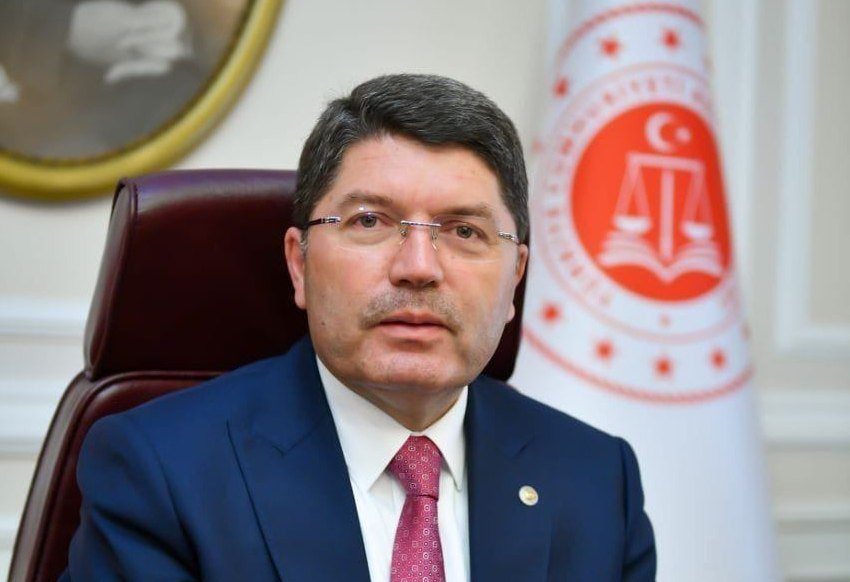
Turkiye's Justice Minister makes press statement regarding arrest of Istanbul's Mayor
Turkiye's Justice Minister Yılmaz Tunç has warned against mischaracterizing ongoing investigations conducted by the independent judiciary, calling it "extremely dangerous and misleading" to describe them with terms such as "coup."
Speaking at the Ministry of Justice, Tunç provided details on the investigations being carried out by the Istanbul Chief Public Prosecutor’s Office, particularly concerning alleged terrorism-related activities and organized crime within the Istanbul Metropolitan Municipality (İBB).
84 Suspects Arrested in "Terrorism and Organized Crime" Investigations
Tunç recalled that as of this morning, arrest warrants had been issued for 106 suspects, including Istanbul Mayor Ekrem İmamoğlu. He noted that two separate investigations were being conducted by the prosecutor’s office.
The first investigation, led by the Terror Crimes Investigation Bureau, involves seven suspects, including İmamoğlu. According to Tunç, these individuals are accused of "aiding a terrorist organization."
The second investigation, carried out by the Organized Crime Investigation Bureau, involves 100 suspects, again including İmamoğlu. The suspects are alleged to have committed crimes such as "bribery, embezzlement, bid-rigging, aggravated fraud, and unlawful acquisition of personal data."
"In total, arrest warrants have been issued for 106 suspects in these two investigations," Tunç said. "As stated in the prosecutor’s official statement, the investigation files contain financial crime reports, tax expert analyses, witness testimonies, and other evidence. The investigation is being conducted with utmost care and diligence."
"Turkey is a State of Law"
Reaffirming Turkey’s adherence to the rule of law, Tunç stressed that judicial authority is exercised independently in accordance with Article 9 of the Constitution.
"Everyone is equal before the law; no individual or group is granted privileges," he stated. "According to Article 138 of the Constitution, courts are independent. No institution, authority, or individual can interfere with judicial processes, issue directives, or attempt to influence the courts. Furthermore, under Article 157 of the Criminal Procedure Code, the investigation phase is confidential. This confidentiality is essential for ensuring justice and protecting the presumption of innocence."
"Misleading Public Opinion is Unacceptable"
Tunç criticized attempts to politicize the ongoing investigations, stating, "It is irresponsible to distort impartial and independent judicial proceedings and label them as a 'coup.' Moreover, making street calls to spread disinformation and mislead the public is entirely unacceptable. In a state of law, if there are allegations of criminal activity, the proper place for defense is the judiciary, not the streets. If evidence exists, the necessary investigations will be conducted by the relevant legal authorities."
He emphasized that judicial processes should not be linked to President Recep Tayyip Erdoğan, calling such claims "unfounded and inappropriate."
"Turkey operates under a principle of separation of powers, with legislative, executive, and judicial branches functioning independently," Tunç said. "The judiciary does not take orders from anyone. Attacking or threatening judicial officials is unacceptable in a democratic state governed by the rule of law."
"Premature Conclusions Are Wrong"
Tunç urged the public to allow the investigations to proceed without interference.
"The judiciary’s decision is binding for all and must be respected. During the investigation phase, claims, defenses, and evidence will be examined, and once confidentiality is lifted, the truth will be revealed transparently. Premature judgments without knowledge of the investigation’s content are inappropriate," he asserted.
He concluded by underscoring the importance of trusting the judiciary, noting that legal recourse remains open for all parties involved. "The judiciary’s actions are subject to oversight. Who is implicated, what their defenses are, and what evidence exists will all emerge from the investigation. We must all patiently await the outcome."























